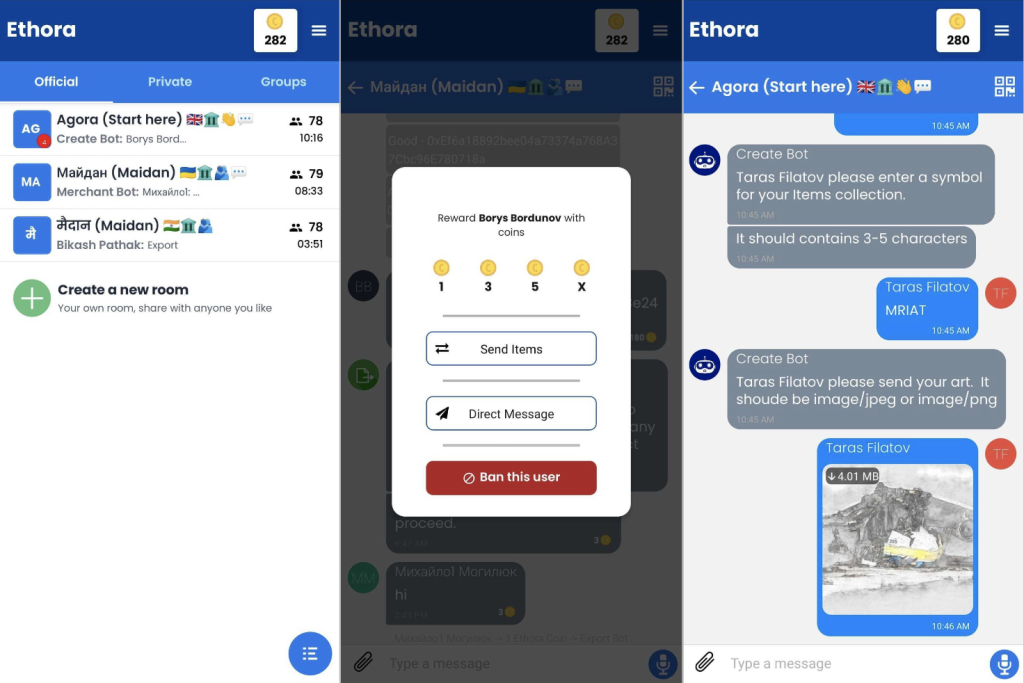Web3 hands out the control of messaging and content of a chat app to its users and project participants.
If you’re a brand trying to leverage Web3 to engage with the right audience or an individual user looking for privacy and security, read this article until the end.
Here, you’ll discover the latest advancements in the niche of Web3-based decentralized messaging and blockchain chat apps, their benefits, use cases, and future potential.
What Is Web3 Decentralized Messaging?
Imagine texting without a giant tech company controlling your messages. That’s the idea behind Web3 messaging. It’s a new way to chat that ditches the usual apps like WhatsApp or Messenger. Instead, it relies on blockchain technology, the same stuff behind cryptocurrencies, like Bitcoin and Ethereum.
Blockchain messaging uses an Ethereum Layer 2 network to save your texts in a decentralized way. It means no single company controls your chats. Hence, all communications and content are more private and secure. Encryption is typically built-in too, scrambling your messages so only you and the recipient can read them.
What Are the Popular Web3 Communication Protocols?
Here’s a breakdown of some popular Web3 communication protocols that various Web3 messaging apps use to facilitate effective and secure conversations:
Blockchain Interoperability: Web3 Protocols like Polkadot and Cosmos facilitate seamless communication between different blockchain networks. Therefore, decentralized messaging apps can serve users coming from different blockchain ecosystems.
Decentralized Storage: Web3 chat apps use IPFS to store the content of the chat app in a network of computers rather than a centralized server.
Messaging Through Contracts: Advanced protocols, like XMTP and Push Protocol, use smart contracts to enable direct, secure messaging between wallets or applications.
Web3 Transformations in Messaging
Let’s dive into the features that make Web3 messaging unique and how they can transform your digital interactions:
Decentralized Messaging
With Web3 messaging, your data is spread across a network of computers, making it tamper-proof and resistant to censorship. No more single point of failure or concerns about a company owning your message history.
User Control
You are the boss of your data. Web3 messaging lets you control who can see your messages and what information you share. Want to disappear from a chat for a while? No problem. You can, at your will, grant or revoke access to your conversations using encryption keys.
Privacy and Security
Web3 messaging prioritizes your privacy. End-to-end encryption scrambles your messages, making them unreadable to anyone except the intended recipient. Since there’s no central server to hack, your conversations are more secure from data breaches.
Spam Control
Tired of pesky marketing messages clogging your inbox? Web3 messaging can help. Imagine a system where users put up a small deposit (in crypto) to send messages. If the recipient marks it as spam, the deposit goes to them, disincentivizing spammers. This community-driven approach could significantly reduce unwanted messages.
Effective Brand Messaging
As a tech or retail business, you can create various groups of leads and customers from different regions with token-gated validation. You can run rewards programs to incentivize your customers with crypto tokens that can be redeemed on your DeFi, Dapps, etc. You can also collect digital wallet usage data to devise the right strategy for tokenized payments.
Integration
Web3 messaging isn’t locked into one app. Imagine using your crypto wallet to chat with friends across different platforms, seamlessly integrated with your existing DeFi tools. This interoperability between apps can create a more unified Web3 experience.
Social Networking
Web3 messaging can completely transform social media content, interactions, and experiences. Imagine connecting with friends and communities based on shared interests, all while managing your identity and data through your crypto wallet. This could lead to more decentralized and user-controlled social networks. Here, you can also kickstart NFT and other tokenization projects for content monetization or just for fun.
Monetization

Web3 messaging opens up new avenues for earning. Imagine tipping creators directly in crypto for their content or even charging a small fee to access exclusive chat groups. Web3 empowers users to monetize their online interactions in more ways like reward coins, NFT minting, etc.
Benefits of Web3 for Secure Messaging Applications
Here are the advantages of shifting to or replacing conventional messaging apps with decentralized messaging:
Blockchain-Grade Security: Your conversations are secured by the same tech that powers cryptocurrencies, like Bitcoin. Web3 messaging leverages blockchain technology to make hacking and data breaches extremely difficult.
Peer-to-Peer Communication: Conversations are faster and more private since you chat directly with your friend, customer, or project members.
Token-Gated Access: Content creators and app developers can create an environment of dedicated and sincere users and supporters. All who are interested in a project must possess a certain token to validate access to the chat groups.
End-to-End Encryption: Web3 applications use end-to-end encryption to scramble messages, ensuring only you and the recipient can read them. While conventional messaging platforms might disclose encryption keys to government agencies or other competent authorities, there is no such possibility in a decentralized messaging app.
Decentralized Data Storage: Web3 messaging doesn’t store your chats on one company’s server. Data is spread across a network of computers, making it harder for hackers to steal or for governments to censor.
User-Owned Identities: In Web3 messaging, you control your identity. You can choose to be anonymous or use a pseudonym, giving you more privacy online.
Permanent Message History: Messages wouldn’t be deleted by the app, potentially offering a permanent record of your conversations.
Smart Contract and Execution: Advanced features could allow automatic actions based on pre-defined conditions within a chat (e.g., sending a micropayment upon completing a task).
Token-Based Micropayments: You could use crypto tokens to send tiny payments directly within a chat. This could be for tipping content creators or rewarding others.
User Decision-Making Processes: Web3 could empower users to have more say in how messaging apps are developed and governed.
One of the best examples of a Web3 chat app offering all of the above benefits is the Ethora super app. It includes design and code features from both the Web3 and Web2 niches. You can quickly convert the Ethora engine into a branded decentralized app for various use cases. For example, use it as a loyalty program platform, health data wallet, for fans connect, or as an AI advisor.
Web3 Chat and Messaging Use Cases
Here’s how brands and projects around you are successfully implementing Web3 for messaging:
Decentralized Social Networks
Independent artists can connect directly with their fans, establish private chat groups for exclusive content, and even receive micropayments through integrated crypto wallets – all without platform fees.
Peer-to-Peer Messaging Apps
For confidential commercial projects in a DAO or any other business, you can create a texting network hosted directly on your and other members’ computers or smartphones. Therefore, upcoming updates, revamped designs, trade secrets, etc., won’t get leaked. If data is found outside your network, you know someone within the P2P network has done it.
Integration of Smart Contracts
Another cool use case would be a chat group where only verified NFT holders can participate. Thus ensuring a specific audience for your discussions. Or a messaging app where payments are automatically sent upon completing a task within a chat.
User-Owned Identities in Web3 Messaging Apps
In many decentralized messaging apps, you’ll find no user ID and password-based sign-in process. Instead, you’ll be asked to select from a list of crypto wallets, like Coinbase, Trust Wallet, Metamask, etc.
You own and control the data synced with the Dapp and crypto wallet. Also, if users make certain transactions in a Web3 chat platform, anyone can use the wallet address to validate the transaction, creating a trust-less and secure platform.
Future of Decentralized Chat Platforms With Blockchain
According to the latest report published by Cognitive Market Research, the decentralized messaging apps market stood at a revenue figure of $42.23 million. The same report expects that the revenue will increase to $628.72 million, with a CAGR of 42.8% in the 2024 to 2031 period.
Such a phenomenal growth will only be happening if blockchain messaging apps can solve the following bottlenecks:
- Signing up and maintaining a crypto wallet requires moderate-level technical expertise. The process should be made more seamless and simple.
- Often, Web3 chat apps might perform slower due to extensive activity on the underlying blockchain. This issue must be addressed with Ethereum L2, sidechains, and scalable blockchains.
- Web3 chat apps of the future should also look into incorporating more blockchain networks besides the popular ones for wider engagement.
- Developers need to make their apps compliant with AML, KYC, FATF, etc., regulatory guidelines.


